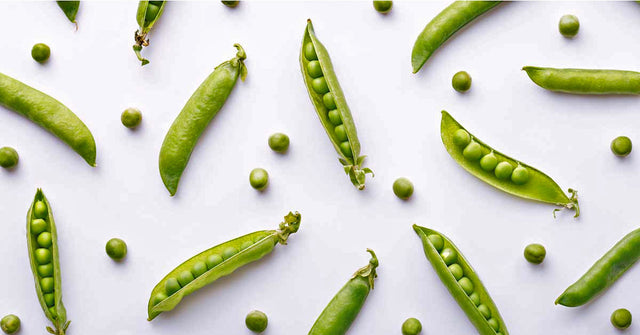Plant-based diets have made their way to main-stream, with more people than ever choosing plant-based options. In fact, according to a recent Nielsen Survey, nearly 40% of Americans are actively seeking out plant-based alternatives. Plant protein offers many health benefits that animal protein doesn’t have, such as valuable micronutrients, healthy fats, and antioxidants. Yet, despite the micronutrient content, studies suggest that animal protein delivers more of the amino acids you need for better overall athletic performance. We're going to find out exactly what the differences are between plant protein vs animal protein.
What Is Protein?
Deciding whether to supplement with plant vs animal protein, really comes down to a few fundamental differences.
- Personal preferences
- Environmental factors
- Your health and fitness goals.
But to know which one to choose, you need to understand protein at its most fundamental level.
Protein is a valuable macronutrient that is responsible for enabling your body to build, rebuild, and repair muscle tissue. Foods derived from both plant and animal sources provide protein, but there are some essential differences when it comes to amino acid content, protein content, absorption, and ergogenic benefits.
What Is Animal Protein
Animal protein is derived from animal sources, such as meat, eggs, and milk. Common forms of animal protein are egg white protein, milk proteins [whey, whey isolate, casein, whey hydrolysate, milk concentrate]
What Is Plant Protein
Plant protein is derived from plant sources such as beans, legumes, nuts, seeds, quinoa, and whole grains. Common forms of plant protein are Pea Isolate (bean), Sacha Inchi (nut), Pumpkin (seed), Watermelon (seed), Soy (bean), Hemp (legume), Rice (grain).
Plant Protein Vs Animal Protein: Amino Acid Content
Protein is comprised of 20 amino acids that are utilized for human growth and metabolism. Often referred to as the building blocks of protein, eleven of these amino acids are considered to be nonessential, meaning that they can be synthesized by your body and do not need to be acquired through your diet. The remaining nine amino acids (methionine, lysine, isoleucine, histidine, valine, tryptophan, threonine, phenylalanine, and leucine.) are essential and need to be consumed through dietary sources of protein or from supplementation. Of these nine essential amino acids, three amino acids are referred to as the branched-chain amino acids, due to their unique molecular structure (leucine, isoleucine, and valine) and are responsible for stimulating the muscle-building process, muscle protein synthesis. The absence of these essential amino acids will inhibit the ability of tissue growth and repair, therefore limiting your capacity to build and rebuild lean muscle mass [R].
RELATED ARTICLE The Ultimate Guide to BCAAs
When a protein source contains an adequate supply of all the essential amino acids, it's considered to be what’s called a complete protein. If the protein source is lacking a certain amino acid or has a low content of one or more amino acids, it’s labeled as an incomplete protein.
RELATED ARTICLE Complete Vs Incomplete Proteins
This is where plant protein and animal protein begin to differ. All animal proteins are complete sources of protein, while some, but not all plant proteins are considered complete.
Animal protein is derived from dairy, meat, poultry, pigs, seafood, and eggs. The majority of animal-based protein powder comes from dairy, such as whey, whey isolate, and casein. Complete sources of protein provide all of the essential amino acids to initiate the building and rebuilding process for your body to adequately recover from training.
|
Essential |
Non-Essential |
Conditionally Essential |
|
LEUCINE |
ALANINE |
ARGININE |
|
ISOLEUCINE |
ASPARAGINE |
CYSTEINE |
|
VALINE |
ASPARTIC ACID |
GLUTAMINE |
|
HISTIDINE |
GLUTAMIC ACID |
GLYCINE |
|
LYSINE |
SERINE |
PROLINE |
|
METHIONINE |
|
TYROSINE |
|
PHENYLALANINE |
|
|
|
THREONINE |
|
|
|
TRYPTOPHAN |
|
|
When it comes to plant protein, not all plant protein sources are created equal. Plant proteins come from things such as beans, legumes, whole grains, lentils, and nuts. Some plant proteins are considered to be complete sources of protein, while others are sub-optimal sources and incomplete proteins. Plant protein sources such as hemp, sacha inchi, quinoa, soy, and pea protein are complete sources of protein. However, even though these plant protein sources are considered to be complete, they do not have the same levels of amino acids that animal protein has. If you choose to live a vegan or vegetarian lifestyle, eating different sources of protein, will often times make what’s called a complementary protein – two proteins when put together, make a complete protein.
Plant Protein Vs Animal Protein: Protein Content
Another major difference between plant protein and animal protein is protein content. Most animal proteins offer a greater concentration of protein at 20-25g of protein per 4oz serving. Most plant-based proteins contain anywhere from 5-10g per 4oz serving. Therefore, you need to consume a much larger amount of plant protein sources, to get the same amount of protein content that you would from animal protein sources.
Plant Protein Vs Animal Protein: Digestibility Rate/Amino Acid Score
Another key difference to observe between plant protein vs animal protein is digestibility. The rate of digestibility determines how effective the protein is in building lean muscle mass and recovery after exercise. Plant-based proteins have less of an anabolic effect than animal proteins due to their lower digestibility, lower essential amino acid content (especially leucine), and deficiency in other essential amino acids, such as sulfur amino acids or lysine [R]. Yet, most clinical research comparing animal protein and plant protein has been done using plant protein powder, not whole plant protein food sources. Some studies suggest that animal protein has better digestibility and therefore floods the muscle tissue with amino acids to initiate the repair process better than plant protein, while other studies show little to no difference at all.
Pea protein, sacha inchi, and soy protein have a high digestibility rate similar to animal protein. Like I said before, not all plant protein sources are created equal and most have several differences
RELATED ARTICLE The Ultimate Guide To Plant-Based Vegan Protein
Plant Protein Vs Animal Protein: Micronutrient Content
The area where plant protein has an edge over animal protein is in micronutrient content. Most plant protein sources contain valuable micronutrients such as zinc, copper, manganese, phosphorus, and magnesium. Plant protein sources such as hemp and sacha inchi contain essential fatty acids (EFAs) Omega-6 and Omega-3. Other plant protein sources contain uncharacteristically high amounts of certain essential amino acids. For example, sacha inchi contains a higher concentration of tryptophan, while pea protein contains an amino acid profile almost exactly of whey protein, with higher arginine content. Animal proteins contain all of the essential amino acids, yet do not contain any micronutrients.
RELATED ARTICLE Plant Protein Sources: 5 Best Plant Protein Sources to Build More Muscle
Plant Protein Vs Animal Protein: Takeaway
When you’re choosing a protein source, it really comes down to preference. A large body of evidence shows that animal protein sources provide better amino acid delivery, digestibility, and protein content than plant protein sources. This is especially important for athletes, as getting the vital amino acids after training is crucial to initiate the muscle rebuilding process. However, if you live a vegan, or vegetarian lifestyle, getting an adequate amount of protein from multiple plant protein sources will ensure that you get the amino acids you need for optimal health and wellness.














